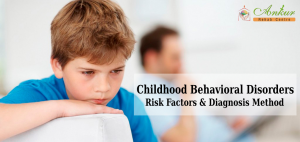
Specialists in the Child psychology segment believe that when it comes to children up to 5 years old, the term “disorder” must be used cautiously.
Expert Professors Daniel S. Shaw and Frances Gardner also affirm that Childhood Behavioral disorder is not permanent if it happens once. It is not confirmed yet that preschool problems point to issues later in life or that behavioral issues are evidence of an actual disorder.
That means, in this age group, a conventional or expert technique to manage behavioral and emotional issues is ideal. And to do that well, it is vital to learn about it comprehensively. So let’s begin…
Early Childhood Behavioral Disorders
It is not easy for a child of 5 years to receive a severe behavioral disorder diagnosis. Yet, you might start seeing symptoms of a disorder in childhood that could be diagnosed at a later age. It may involve:
- Autism spectrum disorder (ASD)
- Depression
- Attention deficit hyperactivity disorder (ADHD)
- Learning disorders
- Oppositional defiant disorder (ODD)
- Anxiety disorder
- Conduct disorders
- Bipolar disorder
Maybe you’ve heard of many of the above-mentioned already. But there are other names that are rarely used during the discussions about childhood psychology.
For example, ODD comprises angry outbursts generally directed at people in authority. But only on the grounds of the behavior for more than six months, a diagnosis is possible and disrupts a child’s functioning. It may also involve physical violence and even illegal activity — very unusual behaviors in early-age children.
Besides, Autism is also one of the names. This affects children in various ways, including socially, behaviorally, and cognitively. They have been deemed a neurological disorder, and the signs may start as early as infanthood, unlike other behavioral disorders. Nearly 68 children are diagnosed with an autism spectrum disorder, based on the American Psychiatric Association report.
Risk Factors in Children’s Behavioral Disorders
The grounds of OCD, ODD, and ADHD are strange, but some of the risk factors comprise:
Gender – It is suggested in many reports that boys suffer from behavioral disorders more than girls. It is still not sure that the cause is hereditary or related to socialization experiences.
Learning difficulties – If kids face any problems with reading and writing, these are often connected to behavior problems.
Intellectual disabilities – Children with intellectual disabilities have better chances of behavioral disorders.
Gestation and birth – Premature birth of babies, complicated pregnancies, and low birth weight may lead to the child’s behavior, in some cases, later in life.
Family life – In dysfunctional families, children are more likely to grow behavioral disorders.
Temperament – Temperamental or aggressive children, who are difficult to manage, are more likely to create behavioral disorders at some stage in life.
Diagnosis Method
The diagnosis method may involve a pediatrician, child psychiatrist or psychologist. The process includes:
- In-depth discussions with the child, parents, and educators
- Behavior checklists or questionnaires
- A diagnosis ( only if the child’s behavior fulfills the norms for disruptive behavior disorders)
It is necessary to rule out critical stressors that might be disrupting the child’s behavior. For instance, an ill parent or victimized by other children might be liable for hasty changes in a child’s typical behavior, and these elements have to be considered originally.
Looking for professional help for your kid? Visit Ankur Rehab Centre. It is one reliable, leading, and central India’s first & only 200-bed professional Psycho-Social Rehabilitation and Best Rehab Center in India. We are known for offering top-most care to all who need help. We foster the best relationships by nurturing hope in all.
Visit our Nasha Mukti Kendra in Indore or reach us today on +91-9893765543





